#oscar zoroaster diggs
Text
Hey RWBY fandom! 📣
I'm doing a thing in part 2 of my STRQ fic and I want to know...
Has anybody done this with Ozma's incarnations before and do we want to debate these/ play "match the names with the faces"?
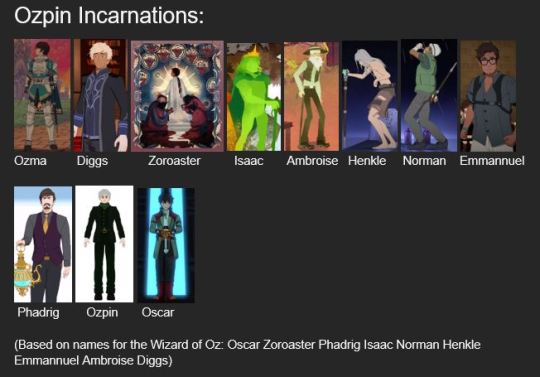
EDIT: upon memory of how the Great War worked, I guess the timeline looks more like this... but I am stretching things having Emmanuel and Phadrig come between the King and Ozpin.

#professor ozpin#oscar pine#ozma#wizard of oz#rwby theory#rwby thoughts#IDK.... it makes sense to me#but I havent heard from the fandom in a while so IDK#rwby#rooster teeth#Oscar Zoroaster Phadrig Isaac Norman Henkle Emmannuel Ambroise Diggs
27 notes
·
View notes
Text
The Wizard Is Wrong (Wonderful)
Across the story of Wicked, the audience has been introduced to characters with varying relationships to the concept of truth. From Elphaba’s unwavering honesty, to Glinda’s dissonant worldview, to the Wizard, who is an idiot and a liar.
I don’t think either of the observations about the Wizard are particularly groundbreaking. What I think is interesting, is how these two cancel each other out. As in, when the wizard tries to lie, he ends up saying things that are true. But this isn’t as obvious for most of the musical because the Wizard spends the entirety of it lying through his teeth.
But what happens when the Wizard tries to be honest? Well, then you get Wonderful.
Let me explain.
SPOILERS AHEAD: (Wicked)

The context around this song is that Oscar Zoroaster Phadrig Isaac Norman Henkle Emmannuel Ambroise Diggs (The Wizard) is trying to convince Elphaba to join him. He has tried deceit and bargaining, but Elphaba is clever, and has called his bluff. So now he is trying a different tactic, honesty. Unfortunately for him, that's not something he's good at.
“Then suddenly I'm here
Respected, worshipped, even
Just because the folks in Oz
Needed someone to believe in
Does it surprise you
I got hooked, and all too soon?
What can I say? I got carried away
And not just by balloon”
In other words, Oz was like this when I got here, I can’t possibly be to blame, right? And if we were to use his version of events, things are simple.
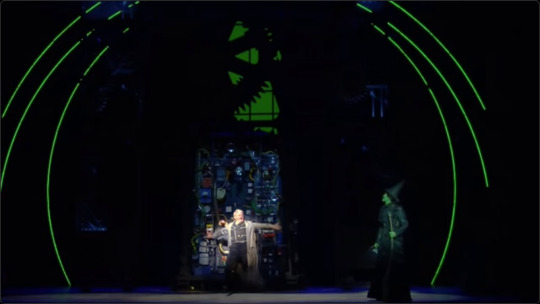
But as it happens, the audience has already been told that this is false. It isn’t an accident that Doctor Dillamond taught history, and that provides some more information. Diggs came to Oz after a drought, and people were looking for people to blame.
The Wizard then stepped into this world, and because he fell from the sky, he was handed everything on a platter. Essentially, Diggs is living a power fantasy.
But on an even more basic level, the people looked to the Wizard for help, and he used that need for personal gain and to oppress a specific group. Even from what he said, he is fully culpable for the current state of Oz, because he actively made the problem worse.

“So you lied to them”
“Elphaba, where I'm from
We believe all sorts of things that aren't true
We call it ‘history’”
This is… complicated. It’s a half-truth misremembered and twisted to fit Diggs’ beliefs. The real idea that this is inspired by is historical bias. By which I mean, if you are being pedantic, it is impossible to be 100% accurate about historical events. You can get really close, but because of biases and contexts that weren’t written down and fragmentary evidence, being entirely accurate is impossible.
There is a difference between “not having all the information”, and “believing a lie”.
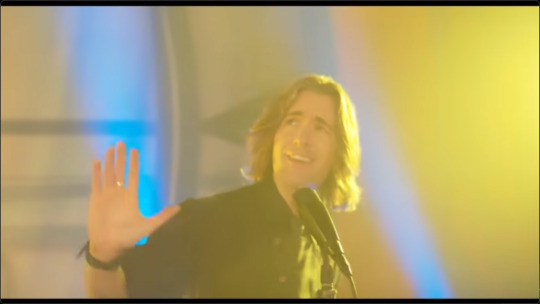
Voiceplay is an Accapella Band who gave their take on the musical as a whole that I highly recommend, and Geoff Castelucci's bass during Wonderful is really good.
The Wizard exists under the effects of a pretty strong Bandwagon Fallacy. Everyone else is doing it, so that makes it ok. But he’s wrong about everyone else, and he’s wrong about whether other people’s actions justify his. In that way, he is an equal opposite to Elphaba, who seeks to do the right thing despite nobody else wanting to make that choice, while Diggs uses those around him as an excuse.
"A man's called a traitor or liberator
A rich man's a thief or philanthropist
Is one a crusader or ruthless invader?
It's all in which label is able to persist"
This is, again, a misremembered half-truth. Because yes, historical bias does exist. There are historical figures who were less than perfect. But that doesn't mean reality changes to match modern biases.
Also, this doesn't actually answer the question he was asked. Diggs was told to justify his decision to become a cult of personality, and his answer was: "history is made of lies". Again, there is a difference between historians simplifying thigs and a person making up a persona for themself. But again, the Wizard suffers from a Bandwagon Fallacy, and so he thinks that this makes him right.
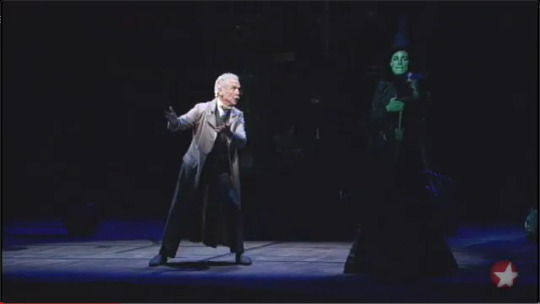
That there is the key, the Wizard is convinced that he is in the right here. But he isn't. The world doesn't work the way he thinks it does. So when he finally leads into his offering, it is already dubious.
"At long, long last receive your due long overdue
Elphaba, the most celebrated are the rehabilitated
There'll be such a whoop-de-doo
A celebration throughout Oz
That's all to do with you"
The Wizard is offering Elphaba what he thinks she wants, because it's what he wants; praise. The Wizard covets attention and is convinced that everyone else is the same, so Elphaba must want that same praise, right?
Not anymore. In The Wizard And I, this is explicitly one of the things Elphaba dreamed of, but now she has learned too much. Diggs is ok with Oz's flaws because they benefit him, Elphaba can't be.
I'm sure The Wizard believes that second bit, but I don't agree. Based just on Oz itself, in what parallel timeline will the people just accept Elphaba after the metric ton of trite that has been talked up about her. The Wizard thinks that prejudice will just go away if you conform, but that isn't how it works at all, and Elphaba knows it.
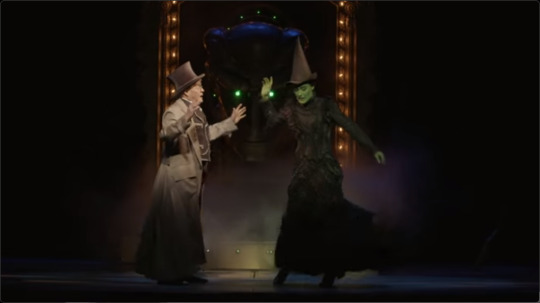
"If that's love, it comes at much too higher cost."
Different song, but it's a perfect putdown to the entirety of the Wizard's antics. He may believe what he is saying, but he is wrong. The acceptance he offers is fake and means that Elphaba must sacrifice everything she wants to achieve it. That isn't worth it.
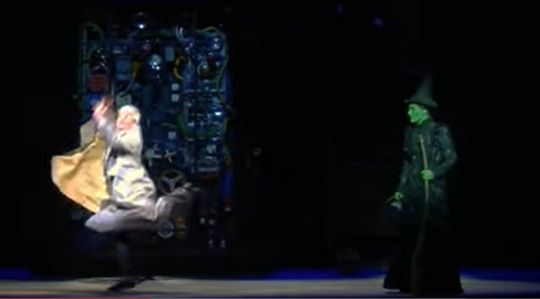
Final Thoughts
For all of his posturing, the Wizard is a remarkably simple character. He wants power, and he lies to get it. But if you combine that with his utterly scuffed worldview, you get some really interesting side effects.
He is also narcissistic, which doesn't exactly help his position. The world has bent over backwards to service his needs, and he has never truly known hardship. He is the stereotypical Iseki protagonist that gives the rest of the genre a bad name, the true Mary Sue.
The problem is, he's also bloody charismatic and fun to watch, which means people listen to him. I've heard people in real life agreeing with his line about labels, and it drives me up the wall.
Next week, I will be looking at the reprise of I'm not that girl, and Glinda's self reflection, as well as As Long As You're Mine. So, stick around if that interests you.
Previous - Next
#rants#literary analysis#literature analysis#character analysis#what's so special about...?#wicked wizard of oz#wicked#wicked the musical#Oscar Zoroaster Phadrig Isaac Norman Henkle Emmannuel Ambroise Diggs#wicked is a queer story
11 notes
·
View notes
Text
Wizard of Oz AU where the Wizard decides that hey, maybe it’s not a very good idea to give away a literal child to a witch who would change her entire identity and raise her as what is basically a nobody, actually, even if he already did usurp her parents. So instead, he secretly adopts Ozma and raises her as his own daughter.
This would especially work if you apply similar motivations to what he has in the Wicked musical (supposedly, assuming he’s not lying out of his ass, also I haven’t read the book so I don’t know if he’s the same there) of always wanting a family but not getting the chance until he arrived in Oz, and/or you could put in some rationalization of having more practical reasons for keeping Ozma around, since pretending to be her actual dad would give his position legitimacy as well as authority over the actual rightful ruler.
Plus, think of the angst potential when she inevitably finds out the truth!
#this can be stretched however which way you want since i have quickly learned that baum’s continuity is very fast and loose#tragic and complicated parent-child relationships are my SHIT#scary individuals and cute kids#au#oscar zoroaster diggs: probably the second most warranted case of imposter syndrome#wizard of oz#ozma#the things i make#star rambles about shit#land of oz#wonderful wizard of oz#princess ozma#marvelous land of oz#special interest tag
1 note
·
View note
Note
Heya, so your meta on RWBY alluding to "The Marvelous Land of Oz" has been rotating in my head like a baked potato for the past few days and I'm all about it. One question that I've come away with though is where exactly does Theodore fit into all this? Everyone assumes he's Dorothy but obviously that wouldn't quite work given the parameters. I was wondering if you could maybe share your thoughts on Theodore and his role in the story to come. Thank you and have a pleasant day :)
there's this thing rwby does with the classic lit allusions—they did this with alice in wonderland too—where the true reference is to the original text and that is layered under an allusion to the better-known pop culture. i think the pop culture layer serves a few key purposes:
it flags the correct allusion for viewers who may not be familiar enough with the original text to recognize the allusion otherwise,
it creates opportunities for narrative sleight-of-hand, both setting up red herrings and rewarding viewers who are familiar with the original texts (<- this was part of what made V9 SO much fun for me as a Wonderland Person), and
it enriches the wider narrative themes about the power of storytelling to shape perception and the idea that truth is hard to find and things are not always what they seem by actually doing that with the key allusions.
for example: in V9, jaune presents as the white rabbit... but his white "rabbit" steed is actually a jackrabbit—i.e., a hare—and after falling backwards in time he became stuck in a metaphorical "time loop," going in circles doing the same things every day without reprieve or any real chance for escape. he lost a quarrel with time and in a sense he is being "punished" for a crime he hasn't yet committed but remembers having committed in the future—that's the hatter / hatta, not the white rabbit. (the alice in wonderland allusion also has a third layer of reference to the frank wildhorn musical, and that layer does some really neat stuff that deserves its own post.)
<- i first noticed this in V9, in part because the wonderland allusion is contained within the arc of a single volume and thus the layering is easier to spot, and in part because i'm better versed in wonderland than i am in the land of oz; but there are also—now that i know what to look for—some obvious signs that the ozian allusion is layered in the same way.
the clearest of those being glynda goodwitch. as i've mentioned before, the classic film adaptation combines glinda and the good witch of the north into a single character and thus creates the problem of why glinda didn't simply tell dorothy from the beginning that those ruby slippers could carry her home. in the book, the good witch of the north directs dorothy to travel to the emerald city to seek the wizard's help because she believes that he's a powerful wizard who will know of a way to send dorothy home. glinda—who is the witch of the south—knows that the wizard is a fraud and does not come into the story at all until dorothy seeks her out after the wizard has been revealed as a fraud and left her behind in oz.
oz is divided into four color-coded provinces: in the north, everything is purple; in the west, yellow; in the east, blue; and in the south, red. the emerald city, in the center, is made to appear entirely green because the wizard "put green spectacles on all the people" to "make the name fit better."
so, in the first episode, rwby introduces:
glynda goodwitch—whose clothing and magic are purple, and who is established in opposition to a mysterious adversary clad in red.
ozpin, the headmaster of beacon academy—note the wizard's initials are OZPINHEAD; his full name is oscar zoroaster phadrig isaac norman henkle emmanuel ambroise diggs.
glynda brings ruby to ozpin and over the course of the next few volumes it's established that she is not only ozpin's deputy but also part of his inner circle and unwavering in her faith in ozpin himself. her narrative role is that of the good witch of the north—not glinda—but her name references the pop culture composite character invented by the classic film.
'the marvelous land of oz' begins after the wizard's departure from oz. insofar as the beacon arc culminates with ozpin's death, this part of the story correlates to 'the wizard of oz'—although it is not 1-to-1 and i would argue that the role of dorothy is diffused between all of team RWBY and JNPR because the only part that matters is how the story utilizes the end of 'the wizard of oz' to subtly insinuate salem into the role of glinda.
see, the wizard intends to bring dorothy with him in his balloon when he leaves oz, but she's delayed—searching for toto—and the ropes anchoring the balloon snap before she can come aboard, leaving dorothy stranded in oz. eventually someone suggests that she ask glinda—the witch of the south—for help. glinda is said to be "the most powerful of all witches" and there is a bit of ambiguity as to whether she is a good witch or not:
"Glinda is a Good Witch, isn't she?" asked the child.
"The Quadlings think she is good," said the soldier, "and she is kind to everyone. I have heard that Glinda is a beautiful woman, who knows how to keep young in spite of the many years she has lived."
"How can I get to her castle?" asked Dorothy.
"The road is straight to the South," he answered, "but it is said to be full of dangers to travelers. There are wild beasts in the woods, and a race of queer men who do not like strangers to cross their country. For this reasons none of the Quadlings ever come to the Emerald City."
(note how she's "the witch of the south"—unlike "the good witch of the north" and the wicked witches of the east and west.)
dorothy and her friends set out on the dangerous journey south to find glinda. the beacon arc ends by setting RWBY and JNR on a course to discover salem, whose existence is revealed to the audience in the last moments of V3. the kids, collectively, are in dorothy's shoes and like glinda, salem is the one person on remnant who understands what the shoes are and how to use them properly—figuratively speaking.
<- so the purpose of glynda goodwitch is to articulate an important thematic conceit: she's glinda the good witch of the north, a character who does not exist in the original book yet dominates the pop culture frame of reference for the land of oz, a character who is also embodies a narrative problem introduced by the conflation of two different characters who fulfill contradictory roles (one believes in the wizard and cannot help dorothy; the other knows he's a fraud and can help dorothy). glynda goodwitch is not just a red herring; her character allusion also comments thematically on ozpin's use of fairytale to distort and control the narrative regarding salem.
anyway.
the salient point with regard to theodore is that while rwby is retelling 'the marvelous land of oz,' it also alludes to the classic film in service of both the retelling and its own deeper themes.
i bring that up because theodore—on top of literally being named dorothy-but-backwards—is described like this:
Finally the double doors to the headmaster's office opened and Theodore strode out, his glittering red-gloved fists raised above his head like he had just one a fight.
[...]
A flowing gray-blue cape, the color of a stormy sky, was clasped around his shoulders with a silver chain. He had a silver belt with a round buckle, matching boots, and bright white slacks with deep side pockets, all carefully orchestrated to draw even more attention to himself.
his appearance is clearly intended to call the pop culture image of dorothy to mind. the glittering red gloves evoke the classic film's ruby slippers, and dorothy is of course transported to oz by a storm.
but mind the details.
theodore fastens his cloak with a silver chain. his belt is silver. his boots are silver (and that is stated obliquely, easy to miss if you skim over this description). silver silver silver. in the original book, the magic slippers are silver, not red. and his wardrobe is "carefully orchestrated" to attract attention.
the land of oz is surrounded on all sides by desert, impassible except by magical means. when dorothy uses the silver slippers to travel back to kansas, they fall off her feet en route and are lost in the desert forever. theodore is the headmaster of shade and de facto king of vacuo—which is a inhospitable wasteland surrounded on all sides by harsh desert. he wears ruby gloves... and silver boots. like glynda goodwitch, his attention-grabbing outward appearance locates itself in a contradiction between the book and the film.
which dorothy is he?
trick question. he represents the silver slippers, fallen to rest somewhere in the desert separating oz from the rest of the world. this serves two important, and interlocking, purposes:
it tells us not to look for a dorothy—because dorothy isn't here. she went home. she's in kansas. dorothy doesn't figure at all in 'the marvelous land of oz' except insofar as the scarecrow and the tin man remember her fondly. (the god of darkness is the real dorothy—because he's gone.)
it marks vacuo as the desert outside of oz—not part of oz.
the second point matters because marvelous land's climactic sequence begins with glinda chasing mombi all the way from the emerald city to the desert past the edge of oz, where mombi collapses from sheer exhaustion and glinda binds her and hauls her bodily back to the emerald city to account for her wrongdoing. this weaves the ozian narrative together with the maiden-in-tower allusions and the little prince like this:
glinda must subdue mombi in the desert before ozma can be released from her curse;
rapunzel's prince is blinded and wanders alone in a wasteland until her voice leads him back to her and her tears restore his sight;
the pilot is stranded in a desert and must learn to see with his heart instead of his eyes in order to find water.
if we examine these together, understanding salem as glinda and rapunzel, mombi as the god of light, and ozma as both the prince and the pilot, that is very strongly suggestive of what is going to happen in vacuo. should rwby continues to follow the plot structure of 'the marvelous land of oz' as closely as it has been, i predict that:
salem will take cinder and return to vale, where her villain -> hero arc will begin facilitated by character development in relation to cinder and summer rose;
they will identify what sort of "deception" ozpin used to hide the relic's location, realize that the extra layer of defense cannot be circumvented, and go to vacuo. (specifically, i suspect ozpin incorporated the branwen twins into the crown's protections);
in vacuo, salem will put all her cards on the table, tell everyone what she is trying to accomplish and why. negotiations ensue. the possibility of freeing ozma from oscar is introduced and possibly carried out. the god of light is symbolically defeated—everyone rejects the divine mandate.
everyone returns to beacon to bring the crown of choice out of its vault and initiate the final confrontation with the god of light.
with most of the curve balls coming from what the vacuo coalition faces while salem is preoccupied with the beacon relic and how everyone reacts to the olive branch of summer rose being... alive.
insofar as theodore figures into this, given the prominence of silver in his character design i wonder if he won't turn out to represent not just the silver slippers that were lost but also the silver wishing pills.
in marvelous land, tip comes into possession of a set of wish-granting silver pills that can grant any wish after being swallowed. when he and his friends escape the conquered emerald city, they accidentally overshoot glinda's home and fly all the way to the far side of the desert before crash landing in a nest of antagonistic jackdaws. tip tries to use one of the pills to get them home, but when he swallows it, it hurts him so badly that he cries out in pain and wishes that he'd never taken it in the first place—which comes true at once. the pill is uneaten. then the woggle-bug uses the same pill to repair their flying contraption* so they can escape from the jackdaws and return to oz.
(*it's called the gump and it's two couches lashed together with leaves for wings, a broom for a tail, and a stuffed elk-like head for a head, brought to life by magical powder. it defies easy description)
so there is some obvious overlap in role between the silver shoes and the silver wishing pills in that both are magical silver items the main characters use to get home—and like the slippers, the pills are lost during the journey home. (the characters conclude that tip must have left them behind in the jackdaws' nest by mistake.)
but the interesting part, as it pertains to theodore, is that when tippetarius tries to use one of the pills, it poisons him. there is nothing actually wrong with the pill itself—the woggle-bug uses it without coming to any harm. the incident is not really explained, but of course tippetarius is under a curse that hides his true identity as the princess ozma and later in the book glinda implies that certain kinds of magic simply do not mix well together; for all her great power, she cannot undo mombi's curse herself because her own magic abhors deception and illusion. so perhaps the silver pill poisons tippetarius because he is not himself. the curse mombi placed upon him blinds him to his true self.
now in rwby, theodore is the last headmaster standing and the effective ruler of vacuo, and the sword of destruction that ozma last used to end the great war is locked in a vault underneath shade academy. if salem does not arrive to lay siege to vacuo as the coalition expects her to, the coalition will face pressure to do something in order to counteract the fraught social and political divisions threatening to tear vacuo apart—remember, this is a country on the brink of civil war that weathered a failed popular coup during the events of V7.
that creates strong incentives for a counter-offensive. to find out where salem is "hiding" after her (as the coalition will see it) pyrrhic victory in atlas and take the fight to her—which sounds great on paper but becomes a rather fraught proposition once salem is discovered to be at beacon. if the vacuo coalition attacks her forces at beacon, vale gets caught in the crossfires—and attacking beacon of all places will not be good for the morale of the coalition's fighters either. but doing nothing may still be the worse option, because that risks the coalition breaking apart without an immediate common enemy to confront. and theodore—as characterized in 'before the dawn'—very much seems like the type of character to favor a counter-offensive under these circumstances.
and that's tip's poison pill—ozma's submission to the divine mandate and the distorted narrative he's constructed around salem prevent anyone on his side of this conflict from seeing another option besides "defend" and "counterattack," when the true solution is "negotiate." the woggle-bug—raven—is able to find the true solution because she holds knowledge about salem (and summer) that the other characters do not. if theodore and his silver trappings represent the pill tippetarius cannot use, then summer and her silver eyes represent the pill the woggle-bug can.
30 notes
·
View notes
Text
Ok, nem tudok tovább elmenni amellett, hogy az Óz (vagy inkább Oz), a nagy varázslóban nem a varázslót hívják Oznak, hanem az országot.
A magyar cím csak egy elbaszás, valójában Oz csodálatos varázslója (The Wonderful Wizard of Oz) volna a helyes.
A varázsló neve valójában Oscar Zoroaster Phadrig Isaac Norman Henkle Emmannuel Ambroise Diggs.
124 notes
·
View notes
Text
The Wizard of Oz's Name
I was watching Jeopardy! today, and one of the categories was 'full names of imaginary characters.' One of the answers was the Wizard of Oz. Turns out this was his real name (from Wikipedia):
Oz explains that his real name is Oscar Zoroaster Phadrig Isaac Norman Henkle Emmannuel Ambroise Diggs. To shorten this name, he used only his initials (O.Z.P.I.N.H.E.A.D.), but since they spell out the word pinhead, he shortened his name further and called himself "Oz"
I don't think I ever thought about what the Wizard's real name might be when I watched the film. But if I did, I would have guessed it came from Shelley's poem "Ozymandias," about the Egyptian Pharoah Ramses II. Clearly that's wrong.
As I've written before, L. Frank Baum, the author of the Oz stories, was a follower of Madame Blavatsky, a founder of the Theosophical Society in 1875. Theosophy is a mystical movement that draws on the ideas of spiritual alchemy, and Baum's fantasy novels are exquisite examples of literary alchemy.
You can see the influence of alchemy in Baum's choice of names for the Wizard, who plays the role of the alchemist in the story: he transforms Dorothy and her companions.
"Zoroaster" is a nod to the Persian sage Zarathustra (fl. c. 1000 BCE), the founder of Zoroastrianism. Zoroaster is the Greek form of his name and the name by which he is known in European sources. Many alchemical ideas can be traced to Zoroastrianism, such as the Sacred Fire and the Four Elements, as I've written before.
More importantly, "Zoroaster" is a nod to the 1667 alchemical work Zoroaster's Cave.
So "Zoroaster" is a clear alchemy reference. "Diggs" might be alchemical as well. In the original treatises of physical alchemy, the would-be alchemist, the adept, is told to seek the philosopher's stone by digging under the earth. Think of the seven dwarfs in Snow White, as an obvious example of this idea being used in a story.

12 notes
·
View notes
Text
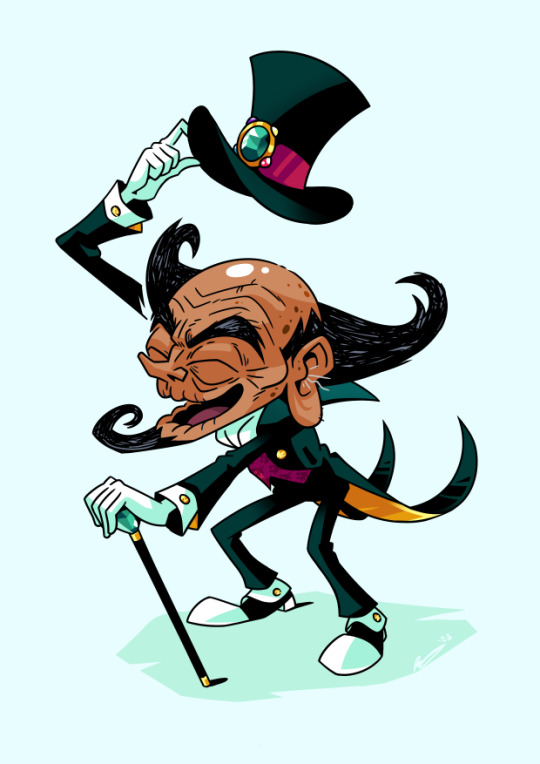
Here is Oscar Zoroaster Phadrig Isaac Norman Henkle Emmannuel Ambroise Diggs, also known as the Wizard of Oz. A stage magician of the mortal world, who got to the magical country of Oz via a ballooning accident. He became the ruler of the place by kidnapping the infant Ozma and giving her to a witch filling in the power vacuum left in Oz when the wicked witches did away with the rightful royal family.
He is outed as a humbug by Dorothy and her crew, revealing that he has no magical powers, only sleight-of-hand and really really good prop-work. Later on, the Princess Ozma later grants him leave to stay in her country and become an apprentice to Glinda, the good Witch of the South.
A likeable and jolly enough person despite the whole false rule thing. He's especially fond of the magic trick with the seven tiny pigs. Will straight up bisect a person with a sword if threatened (that was a plant-person, do they count).
43 notes
·
View notes
Text
WELCOME TO THE OFFICIAL START OF THE CLASH OF THE WIZARDS
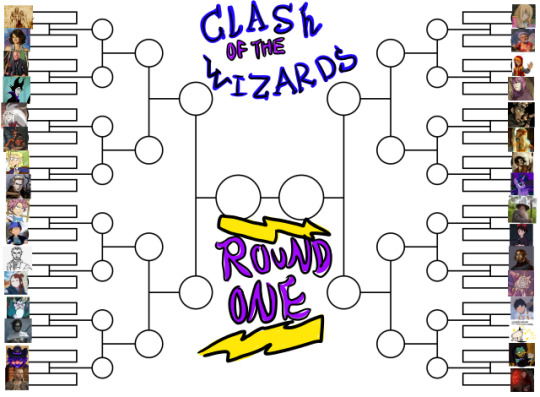
ROUND ONE BEGINS ON WEDNESDAY, MARCH 1, AT 7 AM EST
Your contestants are:
The Witches - Macbeth
Alex Russo - Wizards of Waverly Place
Oscar Zoroaster Phadrig Isaac Norman Henkle Emmanuel Ambroise Diggs/The Wizard of Oz - Oz novel series
Maleficent - Sleeping Beauty
Eda Clawthorne - The Owl House
Rincewind - Discworld
Adaine Abernant - Fantasy High
John Constantine - DC Comics
Natsu Dragneel - Fairy Tail
Schmendrick - The Last Unicorn
Telemain - The Enchanted Forest Chronicles
Akko Kagari - Little Witch Academia
Probabilitor the Annoying - Gravity Falls
Harrowhawk Nonagesimus - The Locked Tomb
M. Rasmodius/The Wizard - Stardew Valley
Anders - Dragon Age
Howl Jenkins Pendragon - Howl's Moving Castle
Fairy Godmother - Shrek 2
The Young Wizard - Wizard101
Elluka Clockworker - Evillious Chronicles
Merasmus - Team Fortress 2
Virtruvius - The Lego Movie
Ged - Wizard of Earthsea
Twilight Sparkle - My Little Pony: Friendship is Magic
Gandalf the Grey - Lord of the Rings
Kiki - Kiki's Delivery Service
Caleb Widogast - Critical Role
Taako Taaco - The Adventure Zone
Oscar Pine - RWBY
Wizard animal - wizardisananimal on Tumblr
Magica de Spell - Ducktales
Doctor Strange - Marvel
Make your propaganda, endorse your faves, be sure to ask me if you have questions, and may the best wizard win!
53 notes
·
View notes
Text
27 notes
·
View notes
Note
Today I learned that the full name of the original wizard of oz character is "Oscar Zoroaster Phadrig Isaac Norman Henkle Emmannuel Ambroise Diggs" and I bet anything at least some of those correspond to Ozma's reincarnations. It just makes sense.
Ozpinhead. L. Frank Baum wasn't the subtlest of men.
19 notes
·
View notes
Text
I've said it before and I'll say it again
Ozma isn't based on Princess Ozma in the Wizard of Oz stories - across every incarnation he is based on Oscar Diggs, the Wizard of Oz (being a liar who supplants a person's identity for his own goals - most explicitly in his most recent incarnation where he is directly named for Oscar Zoroaster Phadrig Isaac Norman Henkle Emmannuel Ambroise Diggs - OZPINHEAD - Professor Ozpin, Headmaster of Beacon)
Oscar Pine is the show's version of Princess Ozma, starting off as a farm boy who has his life turned upside down by the Wizard in an inversion of Ozma's story where she had her throne stolen by the Wizard and was raised as a farm boy named Tip
Ozma and Oscar basically switched inspiration names
and the reason Oscar is a boy is the same reason Jaune and Ren are boys and Pyrrha and Nora are girls - their inspirations disguised themselves or were disguised as another gender from their own
55 notes
·
View notes
Text
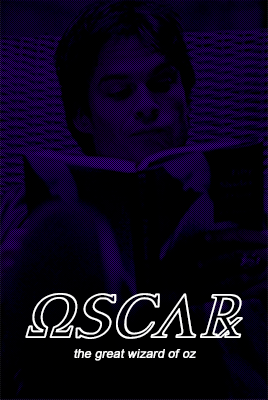

nome completo: oscar zoroaster phadrig isaac norman henkle emmanuel ambroise diggs (ou OZ PINHEAD) pronomes: ele/dele idade: 223 anos ocupação: líder da sociedade secreta dos mágicos sexualidade: panssexual natural de: canto obscuro da inglaterra traços positivos: perspicaz, engenhoso, audaz e carismático traços negativos: egocêntrico, presunçoso, inflexível, vingativo.
tw: provavelmente morte.
biografia
em 1800, em algum cantinho obscuro da inglaterra contemporânea, nascia o jovem oscar zoroaster phadrig isaac norman henkle emmanuel ambroise diggs (ou OZ PINHEAD), como o mais novo de uma família de oito filhos. nomeado em homenagem a uma quantidade absurda de antepassados, a família diggs já tinha sido mais rica em algum ponto da história. eram tempos difíceis, e logo que oscar completou idade o suficiente para começar a trabalhar, seus pais o colocaram como engraxate em frente ao novo trabalho de sua mãe. extremamente carismático desde muito cedo, foi em uma dessas oportunidades que conhecera um rico extremamente influente, que deixou-se ser convencido pelo menino à contratá-lo em um trabalho. alguém fissurado pelos novos balões de ar-quente, o diggs sabia exatamente o que estava fazendo ao conversar com o sr. jean-pierre blanchet, e o plano diabólico daquele menino de oito anos de idade tinha dado perfeitamente certo. todos os dias ele caminhava por uma hora e meia para chegar na casa do senhor, e por todo o resto do dia o ajudava com seu ofício. chegava exausto em casa, mas ganhava o dobro do que seus pais conseguiam num dia inteiro de trabalho. era hábil, e aprendia rápido. insistia tanto para que o blanchet deixasse-o dar uma volta que um dia fora atendido. lá estavam os dois em pleno ar quando o velho leva sua mão até o peito, e exclama de dor. desesperado, sem saber o que fazer, oscar apenas assiste enquanto ele agoniza, caindo do próprio balão de ar quente e deixando o garoto à deriva.
claro que ele não fazia ideia nenhuma de como parar aquele balão. algumas horas após tentativas frustradas e com medo de acabar acelerando sua iminente morte, oscar acabou caindo no sono enquanto chorava recolhido no balão. quando ele acordou, em meio ventos turbulentos, capturou flashes do balão sendo engolido pelo olho de um furacão antes de apagar mais uma vez. seu segundo despertar imediatamente denunciou que toto, we’re not in kansas anymore. a criança chorosa foi acolhida por algumas fadas do sul pouco depois de sua chegada, estas responsáveis pela sua criação. os habitantes de oz o conheciam como o menino que havia caído dos céus, aquele criado por fadas. talvez não existisse um pingo de mágica em si quando saíra da terra, mas ali, oscar tinha sido abençoado habilidades únicas. as fadas responsáveis pela sua criação o edificaram e ensinaram a utilizar seus dons para performar pequenos milagres nos munchkins, oferecendo-lhes aquilo que seu coração desejasse. rapidamente se tornara especialista em ver exatamente aquela peculiaridade: o que o coração de cada um desejava.
suas habilidades atraíram atenção do rei pastoria, que o trouxe para sua corte como o novo mágico da cidade das esmeraldas, que estava sendo construída no coração de oz. era suposto que ele mantivesse sob controle as bruxas más do leste e oeste, agora que as do norte e sul haviam morrido, e no meio tempo, continuasse seus bons atos com os cidadãos de oz. por muitos anos, assim fora. os anos fizeram com que sua mágica se fortalecesse, e a supremacia também era benéfica para o rei até o seu desaparecimento. assumindo o lugar do rei, provavelmente esse foi o último passo para sua corrupção total. décadas, séculos no poder sem ninguém para interferir, a população para aplaudir todas suas decisões. o isolamento de um homem beijado por fadas, que não envelhecia ou ficava doente (como todos os cidadãos de Oz). era sempre tudo do mesmo jeito. e é fácil entender como a depressão chegou, e um menino originalmente bom se tornara…. bem, isso.
o tédio o compeliu a deixar a terra de oz, anos atrás, para construir mais um castelo em tão tão distante. afinal, por que ser ditador em apenas um lugar quando pode ser em dois?
habilidades

details

sociedade secreta

6 notes
·
View notes
Text
The Wizard Is Right? (Sentimental Man)
Here is a question: Does a lie have to be untrue for it to be a lie?
I was to say something, fully believing it to be false, and then find out later that it was actually true and I didn't realise it, am I still lying?
I would argue that the answer is yes. A lie is a willing act of deception. But it's interesting how flimsy the relationship between the concept of truth and reality is.
The Wizard Of Oz is a character who lies through his teeth at all times, with one exception that we will come to in a later post. However, a lot of what he says ends up coming true anyway.
Let me explain.
SPOILERS AHEAD: (Wicked)

Let's be clear about something. The Wizard is not a politician, he's a conman. That is the point of his character. Oz as a whole parodies the performative nature of rulership, how it is often just as much about convincing people that you are doing a good job than actually making changes for the better.
The joke therein, is that this conman got further than anyone who is trained in the field by playing the system how it actually works, rather than how it should function.
So, no, I am not going to draw any conclusions about individuals in the real world, historical or modern. Likewise, I am not going to claim that the Wizard is an allegory for anyone in particular.
Take that as you will.

As we have been making our way through Wicked, we have been introduced to characters with varying relationships with the truth. Elphaba's mother is having an affair, Galinda and Fiyero are both putting up masks to cover up their true selves, and Elphaba has bought in to the mythology of the wizard.
Then we meet a character who is pure deceit in a crystalised form, Oscar Zoroaster Phadrig Isaac Norman Henkle Emmannuel Ambroise Diggs, the Wizard of Oz.
"I am a sentimental man
Who always longed to be a father"
The word sentimental is defined by the Cambridge Dictionary as: "related to feelings rather than reason", and the wizard is certainly not that, because he isn't from Oz at all. He was unwillingly plucked from his true home and placed in Oz, a place that was in the midst of a history defining drought. He remained in Oz for a while before he became the Wizard, and he had no interest in returning home at all.
He also, I will remind you, runs a country based on constant surveillance and propaganda, which is a very detached approach.
The wizard knows all of this, he is complicit in it, so he is lying here, right?

But, he is sentimental, and for that I point to the acting. In the version of Wicked that I went to see, the wizard was played by Simon Burke, who gave the character a vibe similar to Matt Smith's 11th doctor. He is enjoying being in power and taking actions that sabotage the future of Oz in order to stay in power. That doesn't seem reasonable to me.
There is also the fact that his idea of crisis aversion is "giving people a common enemy", something he achieves by actively oppressing a specific group of people. This is bigotry and shows a belief on his part that this group of people is somehow less valuable to Oz, which is irrational, and bigoted.
The frightening thing about Oz, is that I don't think he actually knows why he does what he does. I think he thinks of himself as a chess master style ruler, who makes the optimal decision for Oz at all times. I don't think it has occurred to him that the most optimal decision is to not be the one in charge.
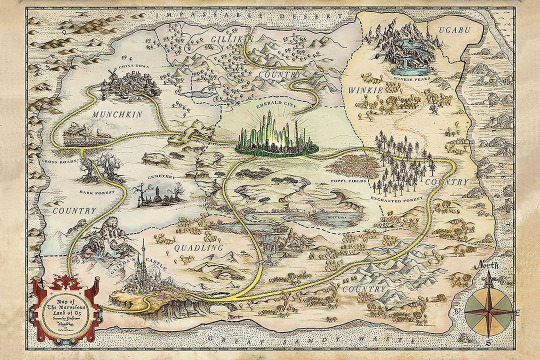
The rest of this song is a metaphor about how the wizard sees himself as the father of his country, and by extension Elphaba. This is what those in the business like to call irony.
I that the effect that the wizard has on Elphaba is fascinating. He inspires her. Although it is important to make a distinction between his mirage and his reality. The Wizard has lied to Oz and sold them an idea of fairness and equality that he is going out of his way to enforce the opposite of.
But that myth that he has created directly inspires Elphaba, as she becomes someone determined to make that false hope into a reality.
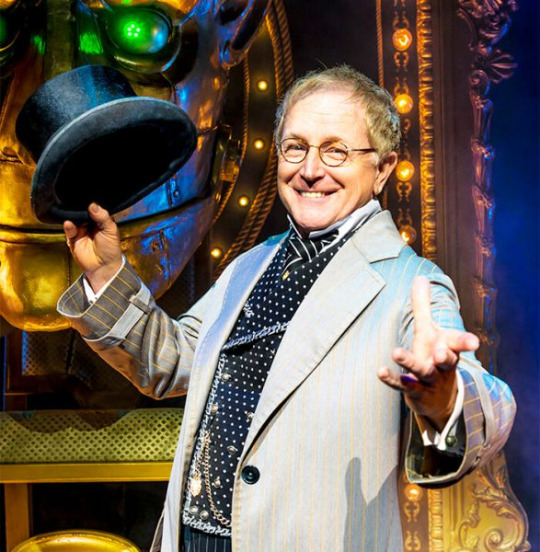
Final Thoughts
I think its rather funny that the Wizards' lies become self fulfilling prophecies, directly causing events later on in the story. It's like fate itself has this guy's number and sent him a text during the intermission that read "I know where you live."
In related news, the wizard's actual name is Oscar Zoroaster Phadrig Isaac Norman Henkle Emmannuel Ambroise Diggs, which is absurd, even for a satire.
Next week, I will be looking at a lesser known part of this musical. it's a small song and not that important, I was considering skipping over it. I think its called Defying Gravity. So, stick around if that interests you.
Previous - Next
#rants#literary analysis#literature analysis#character analysis#what's so special about...?#wizard of oz#wicked the musical#wicked#wicked 2024#wicked wizard of oz
17 notes
·
View notes
Text
fun facts with cheshire
the tin woodman has a name! it’s nick chopper!
the wizard of oz has a name! it’s oscar zoroaster phadrig isaac norman henkle emmanuel diggs!
the wicked witch of the west does not have a name! shut the fuck up!
#cheshire talks#oz#i’m making this post in the middle of the night right now. may come to regret it in the morning idk
17 notes
·
View notes
Note
I submit Oscar Zoroaster Phadrig Isaac Norman Henkle Emmannuel Ambroise Diggs, aka The Wizard of Oz
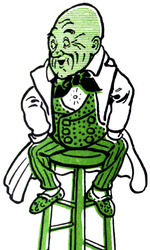
Cool! I'll add him to my list of suggestions now!
10 notes
·
View notes
Text
hi guess what
ch 2 is up! updates will NOT be this rapid in the future so adjust your expectations if you have them lol
#renegade#wicked#wicked musical#wicked the life and times of the wicked witch of the west#elphaba thropp#glinda upland#fiyero tigelaar#boq bfeeson#crope#tibbett#madame morrible#wizard of oz#oscar zoroaster diggs#gelphie#fanfic#wicked fanfic#ao3
9 notes
·
View notes